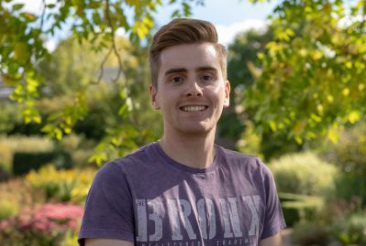
November 17, 2020, by Jackie Thompson
My PhD Journey So Far
By Luke Francis, PhD student
Having reached half time in my four year PhD programme, I think the time is right to think about what doing a PhD is all about – and share this with the lucky reader!
Firstly – why did I do a PhD?
Halfway through my fourth year of my MSci degree I still hadn’t a clue as to what career I wanted (spoiler alert: I still don’t); I decided to talk to my supervisor about what PhD options were being offered in the School of Chemistry.
By far the best option was the Centre in Doctoral Training (CDT) in Sustainable Chemistry, funded by the EPSRC. This programme differs from the conventional PhD in that the first year is a ‘training year’, allowing you to build up your knowledge and confidence before venturing into the lab.
In addition to this the programme offers fantastic opportunities to gain and refine skills; the benefits of the course sold me, and – to my complete surprise – my application was successful.
A common misconception is that to be accepted onto a PhD programme you need to be getting 100% in every exam; in reality as long as you have the correct mindset and good knowledge in your field (which you will: you’re at university after all) then a PhD is something you can realistically consider.
A great supervisor is vital
This, for me, outweighs the research topic; remember you have flexibility with your research and you can tailor it to suit you within reason, but you can’t suddenly make a poor supervisor good.
I’m very fortunate that I have a fantastic supervisor and his expertise is in an area that interests me; hence it was an easy decision to continue my research in his group. If in doubt – ask around in your school; PhD students are more than happy to share their experiences.
There’s more to a PhD than work, work, work
This varies by programme, but there are opportunities within your PhD to pick up and hone new skills, which is of great benefit in the long run.
There are opportunities to mentor students in lower years, deliver presentations, attend lectures and workshops which are not specific to your school, just to name a few. It is important to embrace this with open arms and utilise these free and easy opportunities while you can to maximise what you get out of a PhD… and avoid the burnout from constant office work.
That being said, it will be a grind at times…
This goes without saying, there will be times when things aren’t working as you planned and frustration sets in. However, I have learned that it is better to move on to a different area of your work and come back to the frustrating task more refreshed – this avoids burnout.
Take advantage of the Careers and Employability Service
If, like me, you are unsure or have an open mind as to what to do after your studies, the Careers and Employability Service go to great lengths to help you assess your options. You can arrange one-to-one meetings with experts and there’s lots of in depth information on the their website.
It’s a service I cannot recommend highly enough and one that I am continually using throughout my PhD to establish my journey going forward…as one of the least decisive people in history then if I can find my career going forward then you certainly can!
If you’re an undergraduate or masters student, check out our Thinking about a PhD webpage. If you’re already studying a PhD, you can explore your career options in academia and industry here.
No comments yet, fill out a comment to be the first

Leave a Reply